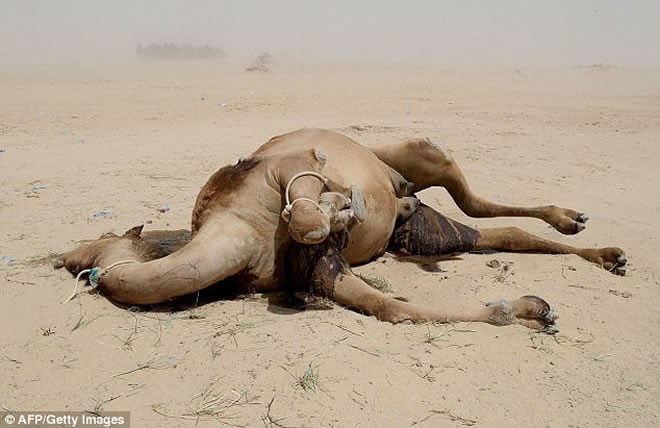
Tuesday July 11, 2017
 Farmers say they were given just an hour to
leave the land the rented in Saudi, and many of their animals died on
the trek back to Qatar
Farmers say they were given just an hour to
leave the land the rented in Saudi, and many of their animals died on
the trek back to Qatar
Hundreds of camels have died of starvation and thirst after being driven out of Saudi Arabia during its row with Qatar.
Some animals perished when they got stuck in No Mans Land at the border between the two countries where there was insufficient food and water.
Others have been left to die by the roadside after their owners were given one hour to leave their farms.
It happened when the Saudis kicked out the Qatari owners of more than 15,000 camels and 10,000 sheep as part of their row with the Gulf tiny state.
More than 9000 camels were expelled in just 36 hours.
Qatar, which is only 4400 sq. miles big, used the vast spaces of its neighbour, which is 830,000 sq miles, for grazing its animals.
Camel owner, Hussein Al-Marri, from Abu Samra, said: 'I have returned from Saudi Arabia. I myself saw more than 100 dead camels on the road as well as hundreds of lost camels and sheep.'
Another farmer, who did not want to be named, added: 'I lost 50 heads of sheep and five camels and there are 10 missing. I do not know anything about them.'
Video footage showed them herded into huge pens after restricted border opening hours meant only a few hundred could cross each day, and many died of thirst or untreated injuries.
Heartbreaking footage showed animals succumbing to the harsh conditions, including one female camel which died while giving birth.
Local reports said 'as many as 100 baby camels died during the arduous journey back to Qatar.'
Another camel owner, Said Al Hajari said: 'It was hard, the camels were exhausted because they did not know which way to go.
'Many died and many had broken legs and injuries, and some of the camels are lost.
'Some of the calves need their mothers' milk and they may die.'
Last month the Saudi Arabia-led alliance launched a diplomatic and transport blockade over Doha's closeness to Iran and alleged links with extremism.
At the same time it ordered all Qataris out of the country, including nomadic farmers and their animals.
Within days of the initial order some 15,000 camels and 10,000 sheep had passed safely back into Qatar.
But herds of animals were still being brought back into the country by farmers two weeks after the crisis began.
But many perished in the desert as temperatures reached 50 degrees C(122F).
Farmers said the situation would have been a lot worse had the Qatari government not intervened.
Many animals were saved when the environment ministry provided emergency shelter for more than 8000 camels on the Qatari side of the border with water tanks and food.
'In the first days of the crisis we faced problems because it happened so quickly,' one owner told The Peninsula newspaper. 'We lost some camels and we don't know if they were already dead or alive.
'Now we have become familiar with the new situation and the Ministry did a lot to help us offering free fodder and water so we appreciate the government for responding quickly.'
The livestock and their animals had been given temporary shelter in south-western areas of the country.
Officials also said that specialist teams of animal experts and veterinarians had been assigned to the farmers.
They added that there were now more one million animals in Qatar, the vast majority of them sheep and goats. There were also around 70,000 camels.
Many camels are used for farming such products as milk and also breeding, a lucrative industry in Qatar, where camel racing remains very popular.
Now the farmers just want everything to return to normal.
'We just want to live out our days, to go to Saudi Arabia and take care of our camels and go back and take care of our family,' said one owner, called Ali Magareh.
'We don't want to be involved in these political things. We are not happy.
'For one week they kept them waiting there. The camels were starving. Some of the males were fighting and in very bad condition.'
A spokesperson for international animal charity SPANA said: 'All too often around the world, working animals and livestock become the forgotten victims of conflict and political disputes.
'It's a situation we've seen countless times before – in Somalia, Mali and many other locations.
'It is critical that the welfare of animals is prioritised and that they receive essential requirements such as food, water, shelter and access to veterinary care.
'It's also important to remember that the communities that depend on working animals worldwide are usually the poorest in society – these animals are often all they have and are absolutely crucial to their livelihoods.
'The loss of their animals can have devastating consequences for vulnerable families.'
There are still 150,000 Qatari camels in Saudi Arabia and it is not clear when or if they will be expelled.